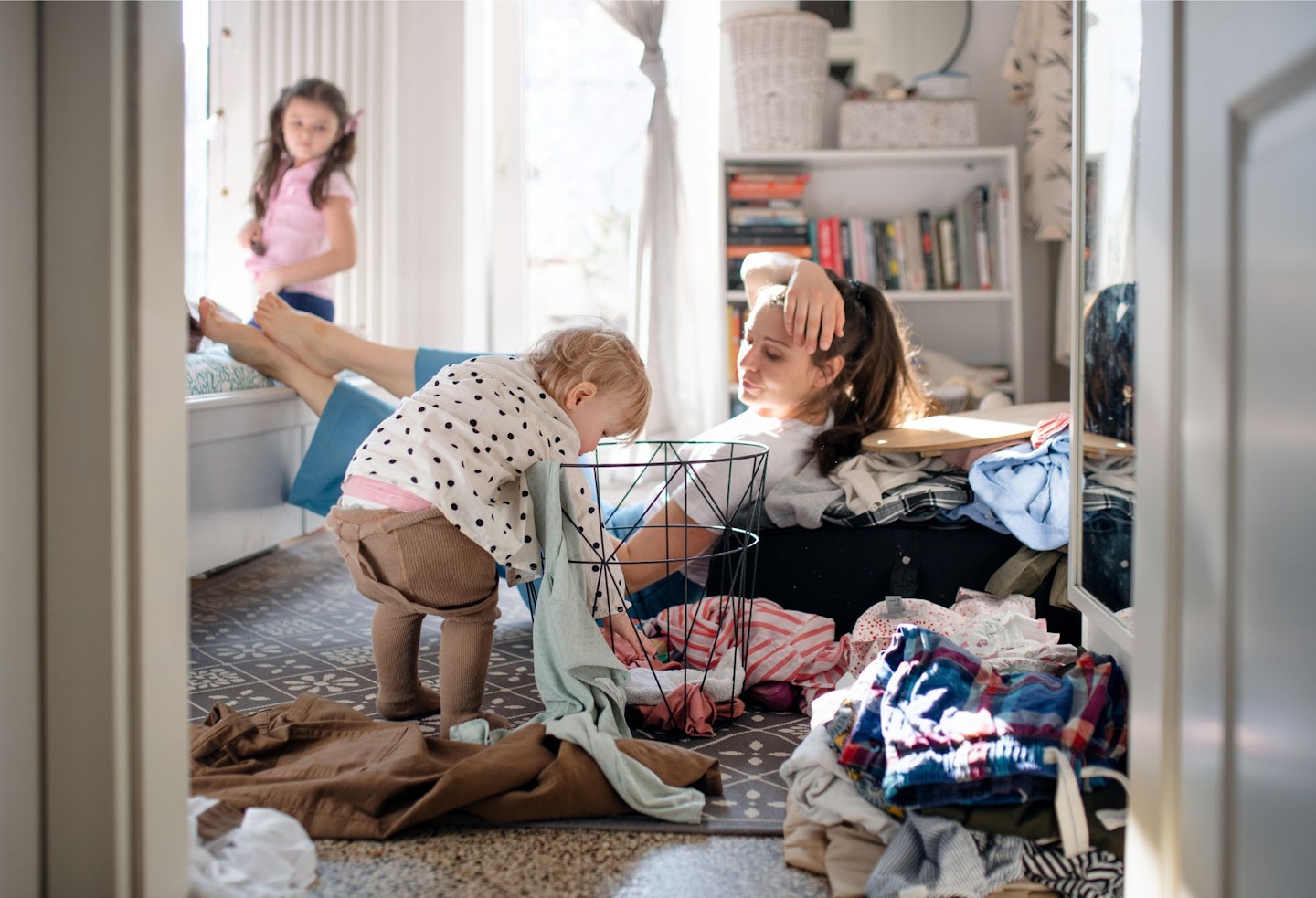Parenting is beautiful, messy, and let's face it, overwhelming. It’s not just about grocery lists, school drop-offs, and appointments. It’s the invisible mental juggling of remembering birthdays, organising playdates, and worrying about your child’s well-being.
Research from the University of Bath reveals that mums take on 71% of household tasks requiring mental effort, compared to dads' 45%.
“This kind of work is often unseen, but it matters. It can lead to stress, burnout and even impact women’s careers. In many cases, resentment can build, creating strain between couples," Dr. Ana Catalano Weeks, a political scientist at University of Bath says.
The mental load is all-consuming, from meal planning to managing emotional needs. While fathers may overestimate their share, many mums, especially single parents, bear the full burden alone.
But mums, it doesn’t have to be this way. By sharing responsibilities and prioritising self-care, we can find balance, avoid burnout, and show up for our families in more meaningful ways.
We spoke to maternal experts to better understand the true weight of the mental load mothers carry every day.

What is the mental load?
The mental load refers to the ongoing cognitive and emotional work involved in managing a household and the myriad of responsibilities that come with it. Often referred to as "invisible labour," it’s the mental burden that isn’t always acknowledged or valued but is always present.
The mental load goes far beyond a to-do list; it’s the constant mental juggling of tasks, plans, and worries. Chloe Lowe, founder of Parent List, describes it as “the thankless, never-ending daily tasks that are necessary to keep your family, home, and life all perfectly spinning, all the time.”
This invisible burden begins the moment you find out you're having a baby, and only intensifies as children grow. From worrying about your child’s safety to planning meals, birthdays, school holidays, and navigating the many decisions in between — it's a heavy mental burden that mothers often carry alone.
Angie Willis, aka The Eco Midwife ((in partnership with MAM) puts it perfectly, “A mother’s work is never complete. They’re always going through a mental checklist of what needs to be done now, in the immediate future, or even years down the road. This constant vigilance can be exhausting.”
For example, introducing solid foods to a six-month-old isn’t just about preparing meals, it’s researching nutrition, planning menus, worrying about allergies, and even remembering to pack the right bibs for outings. Now imagine that kind of effort multiplied across all aspects of parenting, from school drop-offs to bedtime routines. It’s no wonder so many mums feel burned out.

Examples of the mental load
-
Meal planning: Deciding what to cook, checking the pantry, and figuring out what your family will actually eat.
-
School logistics: Remembering assignments, packing lunch, and making sure your kids don’t forget anything for school.
-
Social calendar: Juggling playdates, birthday parties, and coordinating with other parents.
-
Appointments: Keeping track of doctor’s visits, dentist appointments, and school meetings.
-
Household chores: Noting when things run out, from toothpaste to toilet paper, and adding them to the shopping list.
-
Important dates: Remembering birthdays, anniversaries, and special family events.
-
Kids’ needs: Watching for developmental milestones, managing their moods, and keeping tabs on what they need emotionally.
How mums can recognise they're overwhelmed
It’s easy to brush off the signs of overwhelm until you hit burnout. Sophie Scott, psychotherapist and author of You Are Not Alone In This, explains that feelings of “resentment, frustration, or even invisibility” are often signs that you’re carrying too much of the mental load.
“These feelings, left unchecked, can lead to passive-aggressive behaviour, resentment, or reliance on unhealthy coping mechanisms. The key is to acknowledge these emotions without judgment and express them assertively. Reducing your mental load will allow you to be a more present, engaged mum.”

Top tips for managing the mental load
Here’s how to navigate the never-ending mental checklist:
1. Acknowledge and reassess
Start by recognising the emotional toll the mental load takes on you. Accept the messy, ambivalent emotions of motherhood, without guilt. Angie advises, "Reframe parenting as a shared responsibility. We were never meant to parent alone. Dropping some balls in order to meet your own needs is not a failure; it’s a sign of strength."
2. Prioritise tasks (and let go of the rest)
You don’t have to do everything, and you certainly don’t have to do it perfectly. Chloe says, “Focus on your most important responsibilities and commitments. Learn to say no to nonessential obligations and simplify your routines wherever possible.”
Break your day into must-dos, should-dos, and can-waits. Postpone non-urgent tasks and remember: not finishing your to-do list doesn’t mean you’ve failed.
3. Build schedules and systems
Structure can be your best friend. Create regular routines for meals, bedtime, and chores. Chloe adds, “Having a shared schedule or calendar keeps everything on track, so the details don’t stay locked in your head. This makes it easier to share responsibilities.”
Whether it’s a shared app, a whiteboard, or a simple to-do list, externalising tasks helps you (and others) stay organised.
4. Communicate and delegate
You’re not meant to do this alone. Share the load with your partner, friends, or family. As Sophie advises, “Frame your request as teamwork. Instead of saying, ‘I can’t handle this anymore,’ try, ‘Can you take on [specific task]?’”
Be specific about what you need, and once you’ve delegated, trust others to handle it their way.
Angie adds, “When partners take initiative without being asked, it lightens the mental load significantly. Simple acts like anticipating needs and following through can make all the difference.”

5. Practice self-care (without guilt)
Taking care of yourself isn’t selfish, it’s essential. Chloe emphasises, "You can’t pour from an empty cup. Prioritise simple activities that bring you joy, like reading, walking, or mindfulness."
Angie recommends, "physical release through exercise or movement as a way to manage stress and maintain resilience. Whether it’s yoga, a quick 10-minute workout, or journaling, find what recharges you."
6. Strengthen your support network
Join parenting groups, connect with other mums, or seek therapy.
“Sometimes it’s easier to open up to someone who isn’t involved in your day-to-day life. Sharing your feelings makes you realise you’re not alone," Sophie advises.
7. Set boundaries with work and family
Saying “no” can be powerful. Avoid overcommitting yourself, and let go of the need to be perfect. “Boundaries aren’t barriers; they’re acts of self-preservation. When we accept our feelings, they lose their power and that frees us up to focus on what truly matters,” Sophie explains.
8. Recognise the impact of the gender divide
The University of Bath study reveals mums handle 79% of daily jobs like cleaning and childcare, while dads focus more on episodic tasks like finances. Closing this gap starts with awareness.
Dr. Ana encourages couples to have honest conversations, “We hope our research sparks conversations about sharing the mental load more fairly, something that benefits everyone.”
9. Celebrate small wins
Parenting is hard, but it’s also rewarding. Celebrate the little victories — whether it’s making it through a challenging day or a heartfelt hug from your child.
You’re not alone
The mental load isn’t just a personal challenge; it’s a systemic one. By opening up, seeking support, and sharing responsibilities, we can change the narrative.
As Chloe reflects on her own journey, "Parenting is an ongoing process. Be patient with yourself. You’re doing better than you think."
Whether you’re a mum juggling work and family, a single parent navigating it all, or just trying to keep the plates spinning, remember: you’re not alone. The mental load is real, but with the right tools and mindset, it doesn’t have to define your parenting experience.
About the expert
Chloe Lowe is the founder of Parent List, a web based app with 100s of checklists for tasks across self-care, routines, behaviour, activities, food and so much more. At the heart of the app is the desire to give parents a little more time, a little more headspace and a lot of support. This is so that they can better manage their daily juggle, put themselves first and can be the best version of themselves for others.
Angie Willis aka The Eco Midwife has been a midwife for eight years and has worked across different areas supporting women in those years. She's also a Health Visitor and has undertaken training n maternal mental health and aromatherapy.
Sophie Scott is a registered integrative psychotherapist, author of You Are Not Alone In This, and founder of BALANCE Magazine, the UK's award-winning wellness brand. As Editor-in-Chief for over six years, she led industry innovation, working with A-list talent and global brands. Today, Sophie runs a thriving therapy practice with entrepreneurs, executives, and celebrities, and also offers workshops for corporations and MBA students.
About the author
Anne Lora Scagliusi is a Senior Digital Writer at Mother & Baby. She is a Scotland-based journalist with over a decade of international writing experience, specialising in women’s health, maternal mental health, and wellness. Her work has been featured in Vanity Fair, Marie Claire, and Glamour and has appeared on several Vogue global editions. She is mum to a one-year-old bambino and lives between Italy and the UK.
